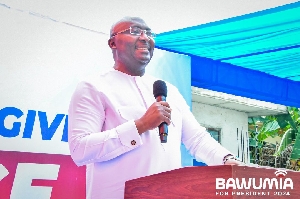- Home - News
- TWI News | TV
- Polls
- Year In Review
- News Archive
- Crime & Punishment
- Politics
- Regional
- Editorial
- Health
- Ghanaians Abroad
- Tabloid
- Africa
- Religion
- Election 2020
- Coronavirus
- News Videos | TV
- Photo Archives
- News Headlines
- Press Release
General News of Friday, 4 September 2020
Source: GNA
Media must ensure environmental justice - MFWA
Sulemana Braimah, Executive Director for Media Foundation for West Africa (MFWA), has urged media owners to allocate additional time and resources to environmental reporting with journos developing greater interest on the subject matter.
He entreated them to identify key documents and institutions that could help them ensure environmental governance reporting.
Institutions such as the National Environmental Policy (NEP), the Constitution, National Climate Change Policy (NCCP) and the Environmental Sanitation Policy (ESP), should be paramount on this journey.
Mr. Braimah, who was speaking during a Media Advocacy Workshop for 23 selected media personnel from the Middle Zone of the country in Kumasi, disclosed that more than half of Ghana’s water bodies had been polluted due to galamsey activities.
The workshop aimed at sharpening the media skills on reportage on issues on anti-corruption laws and environmental governance and seeks to strengthen the Rule of Law and good environmental practices in Ghana was organised by the National Commission for Civic Education (NCCE) in partnership with the European Union (EU).
He said the goal of the media must be to ensure fair treatment and meaningful involvement of all people regardless of their gender, age, and social status in the development, implementation, and enforcement of environmental laws, regulations, and policies.
Mr Braimah said this needed to be done with the view of bringing changes to improve the quality of the planet and by extension of human life in a sustainable way.
He noted that the media could set the agenda to place environmental governance on the front burner of national discourse as well as simplify technical terms and jargons, policies, legislation, practices, impact, and solutions in ways that will be understandable to the public.
Mr. Braimah said people should be given a voice to share their experiences and participate in public debates about the environment.
He said the media should “humanise stories by relating to real life impacts on lives and livelihoods” and also hold duty-bearers accountable to policy.
Mr. Braimah said often, the media was the only source of information the public had about the environment, hence, the need to heighten public awareness about environmental issues.
Ms. Kathleen Addy, Deputy Chairman, Finance and Administration of the NCCE said environmental governance was a key part of the Commission’s projects undertaken in partnership with the EU.
“The environment is very important and safeguarding it for the future is actually critical to the progress of the country and it will be a legacy for the future Ghanaians to come and enjoy.”
She said while the media expressed challenges in these difficult economic times and the impact it was having on media houses, it was important the media reported beyond sensationalism and politics to things that affect people’s daily lives.
“The environment is one such thing which covers a lot of things. Outside of galamsey, there is deforestation, which is extremely important because it has dire consequences for water bodies, the felling of trees, waste disposal, diminishing of our parks and gardens and diminishing green states of our cities.”
Mr. Al-hassan Yahaya Seini, Former Director, Legal Aid Commission said the absence of good record-keeping, lack of effective incentive mechanism and low salaries were some causes of corruption.
He said some recommended areas for advocacy for an amendment to the Constitution and other legislation including ACT 29, which needed to be amended to extend corruption to private persons.
The workshop was on the theme: “Effective public education on Environmental Governance and Amendment of relevant Constitutional provisions in relation to Anti-Corruption Laws: The Role of the Media."











